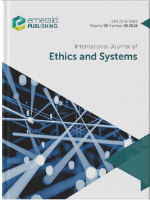
International Journal of Ethics and Systems
Scope & Guideline
Unpacking Complexities in Ethics and Systems.
Introduction
Aims and Scopes
- Ethical Leadership and Decision-Making:
The journal emphasizes research on ethical leadership, exploring how leaders' ethical behaviors influence organizational culture, employee engagement, and decision-making processes. - Corporate Social Responsibility (CSR) and Ethics:
A significant focus is placed on the ethical dimensions of CSR, examining how organizations implement ethical practices in their social responsibilities and the impact of these practices on stakeholder relationships. - Islamic Ethics and Finance:
The journal features studies on Islamic perspectives on ethics, particularly in finance and economics, showcasing how these principles contribute to sustainable development and ethical business practices. - Behavioral Ethics and Organizational Culture:
Research on the behavioral aspects of ethics within organizations is highlighted, including how individual and collective ethical beliefs shape workplace dynamics and employee behavior. - Sustainable Development Goals (SDGs) and Ethics:
The journal frequently addresses the role of ethics in achieving SDGs, investigating how ethical frameworks can guide organizations towards sustainable practices. - Technology and Ethics:
Emerging themes related to ethical considerations in technology, particularly in AI and data usage, are explored, aiming to address ethical dilemmas posed by technological advancements.
Trending and Emerging
- Ethics in Artificial Intelligence and Technology:
There is an increasing emphasis on the ethical implications of AI and technology, highlighting concerns about privacy, bias, and accountability in automated systems. - Integrating Spirituality and Ethics in Organizations:
Research examining the intersection of spirituality and ethical practices in organizational settings is gaining traction, reflecting a broader interest in holistic approaches to leadership and employee well-being. - Crisis Management and Ethical Decision-Making:
Studies focusing on ethical decision-making in crisis contexts, such as during the COVID-19 pandemic, are emerging, showcasing the importance of ethical leadership in turbulent times. - Sustainability and Ethical Consumer Behavior:
The relationship between sustainability practices and consumer behavior is increasingly explored, particularly how ethical considerations influence purchasing decisions and brand loyalty. - Gender and Diversity in Ethical Leadership:
An emerging focus on gender and diversity issues within ethical leadership is evident, examining how diverse leadership influences ethical practices and organizational culture.
Declining or Waning
- Traditional Economic Ethics:
Research focusing solely on conventional economic ethics has diminished, potentially due to a growing interest in more innovative and integrative approaches, such as Islamic economics or sustainability-driven ethics. - Generalized Ethical Frameworks:
The exploration of broad, non-specific ethical frameworks appears to be waning, as there is a trend towards more specialized studies that address specific contexts or sectors. - Corporate Governance without Ethical Context:
Studies on corporate governance that do not incorporate ethical considerations are becoming less frequent, indicating a shift towards integrating ethics more deeply into governance discussions. - Non-Islamic Perspectives on Ethics in Finance:
Research that does not incorporate Islamic perspectives in financial ethics is declining, reflecting a growing recognition of the importance of diverse ethical frameworks. - Static Models of Ethical Behavior:
The use of static models to analyze ethical behavior is decreasing, with a preference for dynamic models that better capture the complexities of ethical decision-making.
Similar Journals
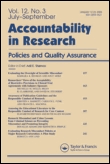
Accountability in Research-Ethics Integrity and Policy
Exploring the Foundations of Ethical Integrity.Accountability in Research: Ethics Integrity and Policy is a distinguished journal published by Taylor & Francis Inc, focusing on the critical intersection of research integrity and ethical practices within various disciplines. Established in 1989, this journal serves as a vital platform for advancing the understanding of accountability frameworks in research, particularly contributing to the fields of education, library sciences, and miscellaneous medicine. With a robust impact reflected in its Q1 ranking in Library and Information Sciences and its significant placements in Education and Medicine (Q2), the journal is highly regarded among researchers and practitioners alike. The journal's objective is to promote scholarly discourse on ethical integrity in research practices, making it an essential resource for academics, professionals, and students who wish to foster responsible research environments. Although it does not operate under an open access model, the journal's comprehensive methodology and insightful articles ensure that it remains influential in shaping the future of research accountability and ethics.

Asian Journal of Business Ethics
Fostering Integrity in Business PracticesAsian Journal of Business Ethics, published by SPRINGER, is a leading academic journal dedicated to fostering interdisciplinary research in the fields of business, ethics, and social responsibility. With an ISSN of 2210-6723 and E-ISSN of 2210-6731, this journal has Made its mark within the global academic community, boasting an impressive reputation reflected in its Scopus rankings across various categories. The journal is particularly noteworthy for its Q3 ranking in Business, Management and Accounting and a Q1 ranking in Philosophy as of 2023. With a commitment to open access, the journal serves as a valuable resource for researchers, professionals, and students in the pursuit of knowledge and best practices that align ethical principles with business processes. The Asian Journal of Business Ethics addresses pressing issues at the intersection of ethics and business while promoting impactful research that can drive practical solutions and inform policy decisions in an ever-evolving global marketplace. Since its inception in 2012, the journal has been instrumental in shaping discourse around ethical business practices, making it a vital outlet for innovative scholarship in the field.
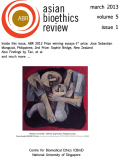
Asian Bioethics Review
Championing Ethical Discourse Across Diverse DomainsAsian Bioethics Review, published by SPRINGER, is a premier journal indexed with ISSN 1793-8759 and E-ISSN 1793-9453, dedicated to advancing discourse in the interdisciplinary field of bioethics across Asia and beyond. Established in 2015, this esteemed publication has rapidly gained recognition, achieving a Q1 ranking in Philosophy and Q2 in key categories such as Health Policy and Issues, Ethics and Legal Aspects in 2023. With its robust Scopus rankings highlighting its significance across diverse domains—including a remarkable 98th percentile ranking in Philosophy—the journal serves as a vital platform for researchers, ethicists, and policymakers to explore pressing ethical issues and contribute to policy development in health and social sciences. Although not open access, the journal ensures a wide reach through institutional subscriptions, making it an essential resource for students and professionals committed to ethical practices in healthcare. Set in the dynamic backdrop of Singapore, "Asian Bioethics Review" continues to shape the conversation around bioethical practices in the Asian context and globally.

Journal of Ethics
Navigating Contemporary Moral ChallengesJournal of Ethics is a premier academic journal devoted to the exploration and analysis of ethical theories and practices within various disciplines. Published by SPRINGER in the Netherlands, this prestigious journal has established itself within the field of Philosophy, boasting a commendable Q1 classification in the 2023 category quartiles. With an impressive Scopus rank of 145 out of 806 in the Arts and Humanities sector, it occupies the 82nd percentile, indicating its significant impact and reach. The journal aims to provide a platform for rigorous discussion and research that addresses contemporary ethical issues, making it an essential resource for researchers, professionals, and students alike. Although not an Open Access journal, it offers various access options to ensure that critical insights and scholarly contributions are disseminated widely.

ENVIRONMENTAL VALUES
Bridging Disciplines for a Sustainable FutureENVIRONMENTAL VALUES is a distinguished journal dedicated to exploring the intricate intersections of environmental studies and philosophical discourse. Published by SAGE Publications Inc, this journal has made a significant mark within its fields, featuring a robust impact factor and making it an esteemed Q2 journal in Environmental Science and a prominent Q1 journal in Philosophy as of 2023. With an ISSN of 0963-2719 and an E-ISSN of 1752-7015, ENVIRONMENTAL VALUES provides a scholarly platform for rigorous research, theoretical exploration, and critical dialogue that spans across disciplines, thereby compellingly addressing the ethical dimensions of environmental issues. Its impressive Scopus rankings place it within the top percentile of both the Philosophy and General Environmental Science categories, underlining its relevance and influence. Researchers, professionals, and students are encouraged to engage with the journal to contribute to and learn from cutting-edge discussions that shape our understanding of environmental ethics and values as we move towards 2024 and beyond.
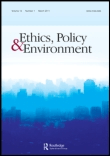
Ethics Policy & Environment
Advancing Knowledge at the Intersection of Policy and NatureEthics Policy & Environment is a prominent interdisciplinary journal published by Routledge Journals, Taylor & Francis Ltd, focusing on the complex interplay between ethical considerations, policy-making, and environmental issues. With an ISSN of 2155-0085 and an E-ISSN of 2155-0093, this journal serves as a critical platform for researchers, professionals, and students engaged in the fields of geography, policy, and philosophy. Highlighting the latest research and theoretical advances, it occupies a strong position within academic discourse, evidenced by its Q2 status in Geography, Planning and Development and Q1 in Philosophy for 2023. The journal has established itself as a key resource for understanding the ethical dimensions of environmental policy, making it essential for stakeholders navigating the challenges of sustainable development. With its coverage from 2011 to 2024, it is a timely source of knowledge that invites contributions that advance the conversation on ethics and the environment.
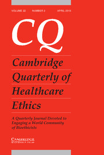
CAMBRIDGE QUARTERLY OF HEALTHCARE ETHICS
Advancing Ethical Standards in Healthcare Practice.CAMBRIDGE QUARTERLY OF HEALTHCARE ETHICS is a premier journal published by Cambridge University Press, focusing on significant issues at the intersection of healthcare, ethics, and policy. With an ISSN of 0963-1801 and an E-ISSN of 1469-2147, this journal serves as a vital platform for discourse among researchers, practitioners, and scholars in the health social sciences. Emphasizing vital ethical considerations in healthcare practices and policies, it ranks in the Q3 tier for Health Policy and Q2 for both Health (Social Science) and Issues, Ethics, and Legal Aspects according to the 2023 journal category quartiles. The journal, spanning its tenure from 1992 to 2024, features rigorous peer-reviewed articles that contribute to the advancement of ethical standards in healthcare. By addressing contemporary ethical dilemmas and promoting scholarly dialogue, CAMBRIDGE QUARTERLY OF HEALTHCARE ETHICS remains an essential resource for those committed to understanding the complexities and ethical implications inherent in health systems today.

Ethical Theory and Moral Practice
Pioneering Research in Ethics and Social ResponsibilityEthical Theory and Moral Practice is a distinguished academic journal published by SPRINGER, focusing on the intricate intersections of ethics, morality, and social philosophy. With an ISSN of 1386-2820 and E-ISSN 1572-8447, it has been a vital platform for scholarly discourse since its inception in 1999, converging its publication years from 1999 to 2002 and then from 2004 to 2024. The journal holds an impressive standing in the academic community, reflected by its Q1 ranking in Philosophy and Q2 in Social Sciences (miscellaneous) for 2023, as well as its notable Scopus rankings in both Arts and Humanities and Social Sciences. Despite being a subscription-based journal, it plays a crucial role in shaping contemporary ethical discussions and provides researchers, professionals, and students with insightful analysis and innovative approaches to moral issues facing society today. Its commitment to advancing understanding in these essential fields underscores its significance as a leading resource for scholars dedicated to exploring moral practice and ethical theory.

International Journal of Business and Society
Empowering scholars to shape the future of business.International Journal of Business and Society (ISSN: 1511-6670) is a prominent academic journal published by UNIVERSITY MALAYSIA SARAWAK, FACULTY OF ECONOMICS & BUSINESS. Established to foster scholarly dialogue and research dissemination in the fields of Business, Economics, Finance, and Management, this journal spans a significant publication period from 2009 to 2024. The journal currently holds a Q3 ranking in its relevant categories, including Business and International Management, Economics and Econometrics, and Strategy and Management, as per the 2023 quartile classifications. With its ISSN number confirming its credibility and presence in the academic community, the journal operates with an open access model, enhancing accessibility for researchers, professionals, and students alike. The International Journal of Business and Society plays a vital role in contributing to theoretical advancements and practical applications, making it an essential resource for those dedicated to expanding the frontiers of knowledge in the global business environment.

JOURNAL OF BUSINESS ETHICS
Cultivating a culture of accountability in corporate governance.JOURNAL OF BUSINESS ETHICS is a premier scholarly journal published by Springer, dedicated to the exploration of ethical issues in business practices and corporate governance. With an impressive impact factor placing it in the Q1 quartile across multiple disciplines including Arts and Humanities, Business Management, and Law, this journal plays a critical role in advancing discussions around ethical decision-making and social responsibility in the corporate world. Since its inception in 1982, the journal has been a vital resource for researchers, professionals, and students, providing a platform for high-quality interdisciplinary research that drives ethical standards in business. The JOURNAL OF BUSINESS ETHICS boasts high rankings in Scopus metrics, including a remarkable 99th percentile ranking in Social Sciences and Law, underscoring its influence and reach within the academic community. The journal is historically published in the Netherlands and is renowned for its commitment to rigorous research methodologies and impactful insights. Through its comprehensive approach, it aims not only to illuminate pressing ethical dilemmas but also to foster a dialogue among stakeholders about sustainable business practices.